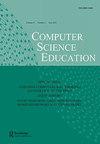Gamification improves the quality of student peer code review
IF 2.2
Q1 EDUCATION & EDUCATIONAL RESEARCH
引用次数: 0
Abstract
ABSTRACT Background and Context Peer code review activities provide well-documented benefits to students in programming courses. Students develop relevant skills through exposure to alternative coding solutions, producing and receiving feedback, and collaboration with peers. Despite these benefits, low student motivation has been identified as one of the challenges leading to poor engagement and substandard review quality. Objective This research investigates gamification as a technique for motivating students to generate high-quality reviews. Method We conduct a randomised controlled study, explore the nature and length of the feedback produced by students, and measure how students perceive the value of the feedback they receive and produce. We manually categorise students’ feedback into several categories adapted from a published taxonomy for student peer review. This categorisation indicates whether the feedback contains actionable advice and identifies strengths and weaknesses in the code. Findings We found that the quality of the feedback differed significantly between experimental and control conditions. Students in the experimental condition wrote longer comments and tended to produce more specific advice for their peers. Implications The findings can assist educators in understanding how the chosen game mechanics can be a potential strategy to motivate students to produce high-quality written feedback in peer code review activities.游戏化提高了学生同行代码评审的质量
背景和背景同行代码评审活动为编程课程的学生提供了充分证明的好处。学生通过接触其他编码解决方案、产生和接收反馈以及与同龄人合作来发展相关技能。尽管有这些好处,但学生动机低被认为是导致参与度低和复习质量不合格的挑战之一。目的本研究探讨游戏化作为一种激励学生产生高质量评论的技术。方法:我们进行了一项随机对照研究,探索学生反馈的性质和长度,并衡量学生如何看待他们收到和产生的反馈的价值。我们手动将学生的反馈分为几个类别,这些类别改编自已发布的分类,供学生同行评审。这种分类表明反馈是否包含可操作的建议,并确定代码中的优点和缺点。我们发现反馈的质量在实验条件和控制条件之间存在显著差异。在实验条件下,学生写的评论较长,并倾向于为同龄人提供更具体的建议。这些发现可以帮助教育工作者理解所选择的游戏机制如何成为一种潜在的策略,以激励学生在同行代码审查活动中产生高质量的书面反馈。
本文章由计算机程序翻译,如有差异,请以英文原文为准。
求助全文
约1分钟内获得全文
求助全文
来源期刊

Computer Science Education
EDUCATION & EDUCATIONAL RESEARCH-
CiteScore
6.90
自引率
3.70%
发文量
23
期刊介绍:
Computer Science Education publishes high-quality papers with a specific focus on teaching and learning within the computing discipline. The journal seeks novel contributions that are accessible and of interest to researchers and practitioners alike. We invite work with learners of all ages and across both classroom and out-of-classroom learning contexts.
 求助内容:
求助内容: 应助结果提醒方式:
应助结果提醒方式:


